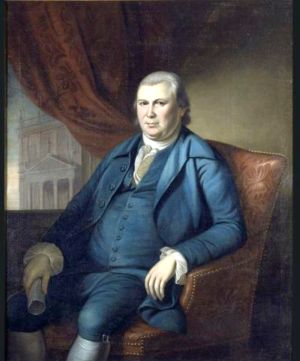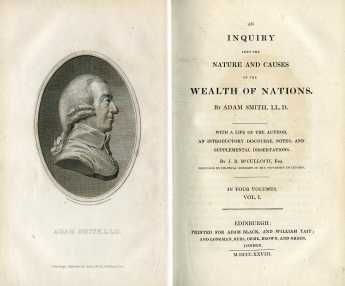Related Topics
Robert Morris and America
Robert Morris was an energetic problem-solver. In solving those problems he devised some innovative solutions which have become such axiomatic principles of a republic and its economics, that his name is seldom associated with them.
Robert Morris: The Dark Side
The richest man in America suddenly was locked in debtor's prison, $12 million in debt. While in prison, he reduced that to $3 million, and got released under a new bankruptcy law he helped devise.
Robert Morris Has a Mid-Life Crisis

|
| Robert Morris |
The feudal system once consisted of Kings awarding aristocrats a title of nobility attached to a region of inhabited land, usually as a reward for military assistance. Because of this link between their wealth and their land, almost no aristocrats migrated to America, so almost no American can now claim hereditary noble descent. What developed instead was the gentry. Regardless of the often unclear sources of their wealth, it was presumed to have arisen from some ancestor's merit, and could only be inherited if it could be made to renew itself. The vast expanses of America cheapened the value of undeveloped land, so the gentry could seldom support a gentry lifestyle without additional employment of some sort. Their children went to college, an experience originally developed for training ministers, who were expected to be the nation's leaders in balance with the tradesmen, who made no secret of their own self-serving. The expectation of community leadership for the gentry outlasted its original attachment to religion, so the non-religious gentry moved about with an air of superiority which others envied but increasingly resented. The novels of Jane Austen are filled with depictions of this sort of person during a period when they were actually rapidly disappearing. The primitive financial system and the enduring mythology of the aristocracy struggled to guide the income sources of this gentry into tracts of resalable land, where they lived off dividends, profits, and rents. Rentiers. Not quite tradesmen, but not genuine aristocrats, either.
Unfortunately, the huge abundance of land in the New World soon cheapened its value to a point where it could not support a lifestyle of entitlement along with contempt for mere tradesmen. This is the explanation often offered for the virtual disappearance of the lifestyle of the Gentleman by the time of the Civil War. The situation was rescued by the invention of corporations; a single man or family no longer could supply all the capital needed to exploit the available commercial opportunities, so corporate ownership was shared with others. Ownership of shares in corporations provided a new stream of income and a new storehouse of wealth, and it also freed the gentleman from ties to a big estate of land. The Jane Austen variety of gentleman thus virtually disappeared but remained as a mythical model for the highest aspirations in the early 19th Century. Robert Morris, orphaned and illegitimate, wanted very much to be an immensely rich gentleman even though that was becoming a contradiction of terms. And although he had virtually been in charge of the whole nation during the Revolution, he wanted very much to be looked to as a leader, then defined as some variant of a theologian. Much of this ambivalence was due to his never going to college, the same guilt which haunted George Washington. Neither of them had sufficient college-educated relatives to appreciate how little college has to do with it. A great deal probably did have to do with historical animosities between Eastern and Western Pennsylvania, between Quakers and Presbyterians, between memories of lingering hatreds among Irish tribes along Ireland's northern border. And yes, between anthracite and bituminous coal. Mountains seem to foster wild behavior, and there are a lot of mountains in Central Pennsylvania.

|
| Adam Smith: Nature and Causes of The Wealth of Nations |
The outcome of these commotions, as well as others unrecognized, was highlighted by the constant difficulties Robert Morris had in the Pennsylvania legislature, contrasted with his comparative ease in both the local Philadelphia political scene and the national one. Only at the state level did it seem that everyone was against him. Particularly so were Findlay and Smilie, western Pennsylvanians who hated him for his self-made wealth but refused to acknowledge the abilities it must surely represent. Like the Lees of Virginia, they asserted the burden of proof was on him, to prove he had not stolen his wealth. After all, all tradesmen were petty cheaters, so a very rich tradesman must be a big cheater. And even setting that aside, he had an odor of sanctity, an air of superiority, which they could not abide. There was even a centrality to this matter resting on Adam Smith, who published The Wealth of Nations in 1776. Smith argued that good things grew out of vigorous competition, and definitely not from altruism. Although Morris was sufficiently taken with Smith's arguments to give copies to his friends, he would not surrender the point that wealth was not necessarily proof of merit, just because merit sometimes led to wealth. Findlay freely admitted he was opposed to the re-charter of the Bank of North America in order to promote the self-interest of western farmers. What flabbergasted Morris was to hear his motives vilified for favoring the re-charter when he owned shares of the bank. Nowadays, everyone would feel astounded if a corporate executive did not vigorously defend his company; but in those days he stood shame-faced to admit he could not possibly be a gentleman and do such a thing. He, therefore, decided to prove his honor by taking an astonishing step. One of the richest men in America sold out his business to prove to these wizened backwoodsmen that he was truly acting like a gentleman. It would be hard today to find anyone who would not describe his action as that of a damned fool.
Originally published: Thursday, September 08, 2011; most-recently modified: Tuesday, June 04, 2019